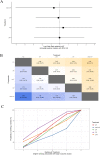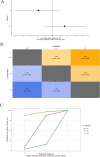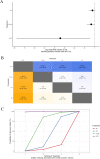Efficacy of different surgical treatments for management of anal fistula: a network meta-analysis
- PMID: 37460830
- PMCID: PMC10485107
- DOI: 10.1007/s10151-023-02845-8
Efficacy of different surgical treatments for management of anal fistula: a network meta-analysis
Abstract
Purpose: Currently, the anal fistula treatment which optimises healing and preserves bowel continence remains unclear. The aim of our study was to compare the relative efficacy of different surgical treatments for AF through a network meta-analysis.
Methods: Systematic searches of MEDLINE, EMBASE and CENTRAL databases up to October 2022 identified randomised controlled trials (RCTs) comparing surgical treatments for anal fistulae. Fistulae were classified as simple (inter-sphincteric or low trans-sphincteric fistulae crossing less than 30% of the external anal sphincter (EAS)) and complex (high trans-sphincteric fistulae involving more than 30% of the EAS). Treatments evaluated in only one trial were excluded from the primary analyses to minimise bias. The primary outcomes were rates of success in achieving AF healing and bowel incontinence.
Results: Fifty-two RCTs were included. Of the 14 treatments considered, there were no significant differences regarding short-term (6 months or less postoperatively) and long-term (more than 6 months postoperatively) success rates between any of the treatments in patients with both simple and complex anal fistula. Ligation of the inter-sphincteric fistula tract (LIFT) ranked best for minimising bowel incontinence in simple (99.1% of comparisons; 3 trials, n = 70 patients) and complex anal fistula (86.2% of comparisons; 3 trials, n = 102 patients).
Conclusions: There is insufficient evidence in existing RCTs to recommend one treatment over another regarding their short and long-term efficacy in successfully facilitating healing of both simple and complex anal fistulae. However, LIFT appears to be associated with the least impairment of bowel continence, irrespective of AF classification.
Keywords: Complex; Fistula-in-ano; Healing; Incontinence; Sphincter preserving.
© 2023. The Author(s).
Conflict of interest statement
Professor Greg O’Grady and Professor Ian P. Bissett have ownership interests with The Insides Company Ltd (Auckland, New Zealand). Professor O’Grady is an executive director, co-founder, and chief scientific officer. Professor Bissett is a co-founder and chief medical officer. Professor O’Grady is also a co-founder and chief executive officer of Alimetry Ltd (Auckland, New Zealand). The remaining authors have no conflicts of interest to disclose.
Figures







Similar articles
-
Ligation of intersphincteric fistula tract (LIFT) for trans-sphincteric cryptoglandular anal fistula: long-term impact on faecal continence.BJS Open. 2024 May 8;8(3):zrae055. doi: 10.1093/bjsopen/zrae055. BJS Open. 2024. PMID: 38843378 Free PMC article.
-
Long-Term Outcomes of Ligation of the Inter-Sphincteric Fistula Tract Plus Bioprosthetic Anal Fistula Plug (LIFT-Plug) in the Treatment of Trans-Sphincteric Perianal Fistula.Med Sci Monit. 2019 Feb 20;25:1350-1354. doi: 10.12659/MSM.914925. Med Sci Monit. 2019. PMID: 30783076 Free PMC article.
-
External sphincter-sparing anal fistulotomy (ESSAF): a simplified technique for the treatment of fistula-in-ano.Tech Coloproctol. 2021 Dec;25(12):1311-1318. doi: 10.1007/s10151-021-02525-5. Epub 2021 Oct 1. Tech Coloproctol. 2021. PMID: 34599414
-
One stage fistulectomy for high anal fistula with reconstruction of anal sphincter without fecal diversion.Asian J Surg. 2019 Aug;42(8):792-796. doi: 10.1016/j.asjsur.2018.12.005. Epub 2019 Feb 6. Asian J Surg. 2019. PMID: 30738718 Review.
-
Systematic review and meta-analysis of endorectal advancement flap and ligation of the intersphincteric fistula tract for cryptoglandular and Crohn's high perianal fistulas.BJS Open. 2019 Jan 21;3(3):231-241. doi: 10.1002/bjs5.50129. eCollection 2019 Jun. BJS Open. 2019. PMID: 31183438 Free PMC article.
Cited by
-
Fistulectomy and primary sphincter reconstruction for high cryptoglandular anal fistula: a retrospective cohort study with long-term results.Surg Endosc. 2025 Mar;39(3):2073-2079. doi: 10.1007/s00464-025-11585-9. Epub 2025 Feb 3. Surg Endosc. 2025. PMID: 39900860 Free PMC article.
-
Understanding the anatomical basis of anorectal fistulas and their surgical management: exploring different types for enhanced precision and safety.Surg Today. 2025 Apr;55(4):457-474. doi: 10.1007/s00595-025-02995-2. Epub 2025 Jan 31. Surg Today. 2025. PMID: 39888400 Free PMC article. Review.
-
Needs Analysis of Supportive Care for Postoperative Wound Rehabilitation in Anal Fistula Patients Based on the Kano Model.J Multidiscip Healthc. 2025 Aug 27;18:5289-5298. doi: 10.2147/JMDH.S535960. eCollection 2025. J Multidiscip Healthc. 2025. PMID: 40895331 Free PMC article.
-
Mid- and long-term functional outcomes of advancement flap for cryptoglandular perianal fistulas.Tech Coloproctol. 2025 May 9;29(1):112. doi: 10.1007/s10151-025-03148-w. Tech Coloproctol. 2025. PMID: 40346397 Free PMC article.
-
Comparative Evaluation Between Cutting of the Intersphincteric Space vs Cutting Seton in High Anal Fistula: A Randomized Controlled Trial.J Am Coll Surg. 2024 Dec 1;239(6):563-573. doi: 10.1097/XCS.0000000000001192. Epub 2024 Aug 21. J Am Coll Surg. 2024. PMID: 39166759 Free PMC article. Clinical Trial.
References
-
- Steele SR, Kumar R, Feingold DL, Rafferty JL, Buie WD. Standards practice task force of the american society of colon and rectal surgeons. Practice parameters for the management of perianal abscess and fistula-in-ano. Dis Colon Rectum. 2011;54(12):1465–74. doi: 10.1097/DCR.0b013e31823122b3. - DOI - PubMed
Publication types
MeSH terms
LinkOut - more resources
Full Text Sources

